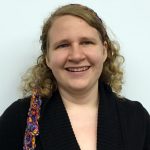
This Forum Update was provided by Megan Browndorf, Research and Instruction Librarian, Albert S. Cook Library, Towson University.
In my lunch session today we tried to sketch out “Librarian 3.0,” to try to determine the skills and duties of the new librarian and the librarian of the future. How can the librarian move beyond the traditional 1.0 gatekeeper role, and even beyond a 2.0 facilitator-like role, toward something else entirely? By defining the librarian of the future and their goals and challenges, we can make a conscious effort to change the librarians we are now and tackle those challenges.The work being done at the DLF Forum, the conversations that we had here, and both keynote speakers’ thoughtful calls to arms, all sought to move us forward in the effort to define the librarian of the future and change ourselves today.
I have loved absorbing these ideas and participating in these conversations. My very first job after graduation was as a Digital Projects Coordinator at Dickinson College and I held a couple part-time digitization positions during graduate school at Indiana University. So, I do have a small background in digital libraries and can understand and speak this language. But my post-MLS work has been in reference, research, and instruction, making me feel somewhat like an outsider in the DLF conversations. However, it allowed me to listen and participate with a completely different perspective and set of experiences.
In the back of my head I was constantly thinking about my History students. How do I teach these new technologies and ways of thinking about scholarship? How do I lay the foundation for students to eventually become fluent in digital scholarship? How do I get students to think about the work that goes into creating these resources and the complicated underpinnings of the Really Cool Primary Source Collection of the moment? Should I make an active effort to complicate student understanding of the research ecosystem and pull them into this world of digital tools, libraries, and new ways of exploring information?
Unequivocally, yes. Perhaps it is my personality or my teaching style, but I feel like my entire reason for being (as an instruction librarian, at least) is to complicate my students’ lives and their approach to information. From my experiences teaching, from my experiences in digitization, and from my experience this week, I feel even stronger that teaching more nuanced approaches to digital technologies and the research process are necessary to student success in research and citizenship.
Bonnie Tijerina of the Data & Society Institute delivered the closing keynote address, “Libraries, Librarians, and the Future of the Web,” which called us to bring librarian specialties and foci to the broader tech culture. Our professional esteem for openness, sharing, access, privacy, and community building, among other qualities, aligns perfectly with the larger cultural needs of a changing world of big data and threats to privacy. Tijerina argues that the web and society at large, as it learns to navigate the issues of new technologies, needs librarians. Not for our reference resource, XML, or Dublin Core knowledge, but rather for our professional competencies, inclinations, and history of balancing openness, privacy, and sharing. As she eloquently stated, many of the problems and uncertainties that technologists are presently coping with are ones that librarians have been navigating since the founding of our profession.
In the “Librarian 3.0” lunch we were asked to brainstorm qualities for a digital coordinator job advertisement. The small group that I worked in decided that more than specific technical skills, we wanted an individual with communication skills, able to collaborate freely between different stakeholders, and an ability and willingness to learn. Another group phrased it “attitude trumps skills.” I would never argue against the value of more technical skills. However, the qualities that allow librarians to approach the bigger picture issues, identified by both Nowviskie and Tijerina as our higher calling, are those basic tendencies toward sharing, access, and collaboration at the heart of our profession. I am not a digital librarian, but not once did I feel unwelcome at this conference. Every session I attended offered me something I can bring back to my practice. On an overarching level this conference provided me with new ways to think about skills, expertise, and professionalism; to think about the intersection of creator, user, researcher, and learner in the digital realm; to think about what we are doing as librarians and why we are doing it. I am grateful for that experience and look forward to the changes I can incorporate at the reference desk and in the classroom.
